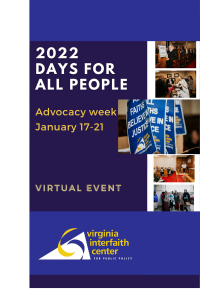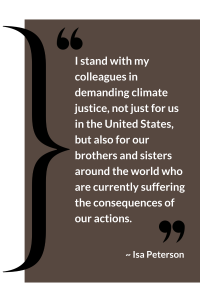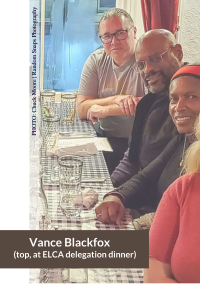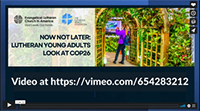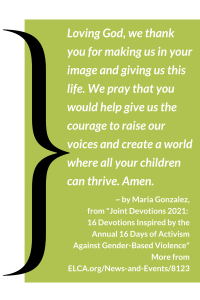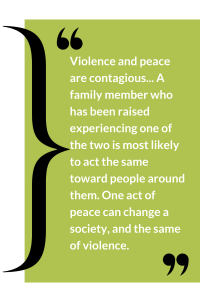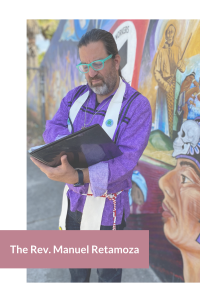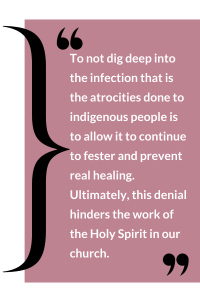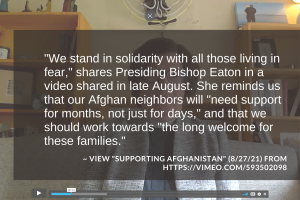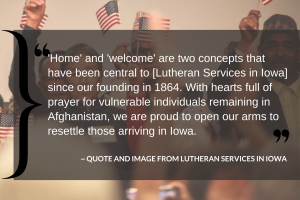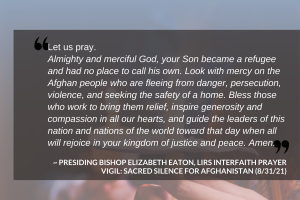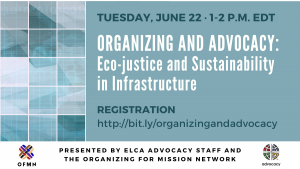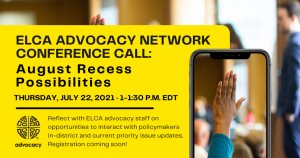DOMESTIC | ENVIRONMENT | INTERNATIONAL | MIGRATION | MIDDLE EAST | CIVIC ENGAGEMENT | GETTING INVOLVED
Also available as a downloadable pdf from ELCA advocacy resources page
Every public policy decision has an effect on us and on our neighbors, even neighbors living across the country or around the world. This compels us as church to “unite realism and vision, wisdom and courage, in its social responsibility. It needs constantly to discern when to support and when to confront society’s cultural patterns, values, and powers” (ELCA social statement Church in Society: A Lutheran Perspective, p. 3).
By building relationships with policymakers, taking joint action with values-sharing issue partners, writing comments and much more, we advocate to end world hunger and stand up for policies that create opportunities to overcome poverty, stimulate peace and dignity, preserve God’s creation, promote racial and gender justice, and promote good order in public life. Shaped by the ELCA’s social teaching documents and the experiences of its congregations, ministries and partners, the following are policy priorities on the federal horizon for advocacy action in 2022.
 Domestic Policy
Domestic Policy
“The power of God’s suffering, self-giving love transforms and challenges the Church to stand with all who are overlooked for the sake of economic progress or greed. Confession of faith ought to flow into acts of justice for the sake of the most vulnerable” (from ELCA social statement Sufficient, Sustainable Livelihood for All, pg. 4-5).
-
- Hunger and poverty – restore, protect and adequately fund food security and child nutrition programs, and advocate to make permanent the Child Tax Credit and Earned Income Tax Credit for low-income families. Support measures to reduce economic disparities and reach baseline wages above poverty level.
- Health care – ensure access to affordable, quality health insurance, recognizing the state-by-state regulatory impact to Medicaid access, and support legislation that addresses racial and economic disparities in health outcomes. Ensure preparedness for public health challenges, such as COVID-19 efforts.
- Housing – increase shelter, housing and development budget resources, with a special focus on rural development, eviction or foreclosure prevention, HIV and AIDS housing assistance, affordable housing for seniors and ending homelessness. Expand access to resources that help expand homeownership, reduce gentrification displacement and build more affordable housing.
- Disaster response – improve federal programs that manage community rebuilding after natural disasters and uplift recommendations of impacted churches and ELCA ministries in public policy consideration.
- Criminal justice – address, with legislative proposals, systemic racial bias in state and federal incarceration systems which unfairly impact communities that face barriers, unjust treatment, violence or inequalities based on race, ethnicity and culture.
- Civil and human rights – support bipartisan voting protections to ensure no entity can interfere with the right of any citizen to vote in locally, state or federal elections. Assure prohibition of discrimination based on sex, sexual orientation and gender identify in such areas as public accommodations and facilities, education, federal funding, employment, housing, credit and the jury system.
- Gender justice – support reauthorization and improvement of legislation that combats gender-based crimes such as domestic violence, human trafficking, sexual assault and other forms of violence against women, including recognition of the crisis of missing and murdered Indigenous women.
- Realize racial justice – examine and advance action such as the Truth and Healing Commission on Indian Boarding School Policies Act and the Commission to Study and Develop Reparation Proposals for African Americans.
- Set the stage for the farm bill – highlight intertwined priority issues in preparing for the consideration of the 2023 Farm Bill, including retention of funding for domestic nutrition programs, conservation measures, insurance protections, climate viable solutions for agriculture, farmworker realities and global hunger relief implications.
 Environment Policy
Environment Policy
“The principles of participation, solidarity, sufficiency, and sustainability will shape our advocacy—in neighborhoods and regions, nationally and internationally. Our advocacy will continue in partnership, ecumenically and with others who share our concern for the environment” (from ELCA social statement Caring for Creation: Vision, Hope and Justice, pg. 10).
-
- Creation care – advance policies geared toward bridging ideological divides while addressing the impacts of environmental degradation. Advocate for comprehensive energy, greenhouse gas emissions mitigation, and adaptation legislation and policies for reaching carbon neutrality.
- Climate change – promote policies that provide needed technology transfer and international climate finance, which includes financing for loss and damage and avenues for reaching a just transition.
- Climate and environmental justice – promote environmental justice and other legislation and policies that address the interconnectivity of environmental, economic and social issues that advance strategies for remedying and eliminating systemic biases and injustices impacting vulnerable communities.
- Sustainability – advance policies and legislation calling for a better quality of life today without shortchanging future generations, which includes legislation promoting transitioning away from fossil fuels, such as tax credits, and regulations that mandate industrial facilities to reduce air, water and soil pollution. Promote innovation, research and conservation practices in rural and agricultural sustainability measures under the farm bill.
 International Policy
International Policy
“Yet we do not possess uniquely Christian international policies or a divine or biblical politics for our nation. For political guidance we also must rely upon reason and compassion, and examine and draw upon common human experience through which, we believe, God is at work creating and preserving the world” (from ELCA social statement For Peace in God’s World, pg. 9).
-
- Global hunger and poverty – ensure programs that work to fight hunger, poverty and disease around the world are well funded, including humanitarian relief and economic development support efforts.
- Conflict prevention, peace building and human rights – urge increased investments in programs that address fragility and other causes of conflict before they occur and promote nonmilitary solutions to conflict. Foster a rights-based approach to conflict resolution programs and peace-building efforts, including protection of civilians and minority groups.
- Gender justice – safeguard and expand safety, empowerment, and rights of women and girls in U.S. international programs. Support legislation that expands protection and promotes comprehensive well-being of women and girls.
- Global health – galvanize robust appropriations for U.S. programs addressing global pandemics, epidemics and endemic diseases such as HIV and AIDS, malaria, tuberculosis and COVID-19. Support efforts to ensure that people on the margins have access to prevention tools, diagnostics, vaccines, treatments and care.
 Migration Policy
Migration Policy
“[Newcomers] keep before us—so that we do not forget—the grim realities many immigrants face and the strength of character and resourcefulness newcomers demonstrate. They inform us of conditions in other countries and what the role of the United States has been. They provide our church with experience and knowledge to take part in public deliberation on immigration, refugee, and asylum policies” (ELCA social message on “Immigration,” p. 6).
-
- Rights of migrants and refugees – advocate for an immigration system that prioritizes human rights, justice, family unity and reunification. Promote equitable access to federal programs. Strengthen the Deferred Action for Childhood Arrivals (DACA) and Temporary Protected Status (TPS) policies and pathways for gaining permanent legal status and citizenship.
- Detention and enforcement – support community-based alternatives to detention, enforcement reform, humanitarian reception and border demilitarization in alignment with international principles and values on migration. Advocate against deterrence and externalization policies that harm migrants, native lands and border communities.
- Asylum and refugee protection – respond to global forced displacement by advocating for shared frameworks for processing vulnerable migrants that include strong access to protection and due process.
- Foreign policy and climate displacement – drive investments in human security to alleviate the factors forcing families to flee, including just trade, development and foreign assistance, in ways that are accountable to civil society. Integrate front-line voices in climate adaptation, resiliency and protection options.
 Middle East Policy
Middle East Policy
“But neither inaction nor weak action is an option for the ELCA if it intends truly to accompany the Evangelical Lutheran Church in Jordan and the Holy Land, the LWF Jerusalem program, and other partners in this time of urgent crisis and opportunity” (from “Churchwide Strategy for Engagement in Israel and Palestine,” Section IV).
-
- Humanitarian assistance – end politicization of humanitarian aid and resume funding to humanitarian actors working in the West Bank and Gaza. Work with congressional leaders and the administration to ensure funds appropriated for humanitarian programs in the West Bank and Gaza, including Augusta Victoria Hospital (AVH), are obligated.
- Ensure accountability – hold the government of Israel accountable for the use of military assistance that violates the human rights of Palestinians, such as illegal occupation of the Palestinian territories, the detention of Palestinian children in military prisons, the violent repression of peaceful protesters, and demolitions of Palestinian homes and communities.
- Freedom to move, speak and act – oppose anti-Semitism as well as efforts to conflate it with prohibitions on speech critical of Israel and other actions making it illegal to engage in constitutionally protected and legitimate speech. Urge an end to punitive visa bans, family entry bans and asset freezes on select officials of the International Criminal Court. Promote greater movement and access in the Occupied Territories, including for Gazan patients to reach AVH.
- Settlement activities – impose consequences on the Israeli government for future settlement activities it authorizes or undertakes in contradiction to the U.S. position that settlements are illegal under international law.
 Civic Engagement
Civic Engagement
In the ELCA we shall “work to further democratic processes throughout the territory of this church and the world, and to redress the persisting social and economic inequalities that prevent many from participating effectively in those processes” (from ELCA social statement Church in Society: A Lutheran Perspective, p. 7)
-
- Dialogue and presence in fracturing times – make the most of the presence of Lutherans in every congressional district and county across our nation who are living a life free to serve with and for our neighbors in vibrant civic life and are engaged in houses of worship, social ministries and community activity.
- Election security and voter access – uphold voting rights in policy consideration and in civic engagement with tools such as registration drives while being aware of historic and contemporary voter suppression in electoral process participation.
How can you get involved?
Our ministry of advocacy is a public witness to God’s love for our neighbor, ourselves and for all creation. In addition to activity in Washington, D.C., on federal advocacy priorities, this public witness is also organized by state public policy offices in the ELCA Advocacy Network, through our ELCA Corporate Social Responsibility strategy and by Lutheran Office for World Community representation to the United Nations – plus the advocacy of members, congregations and synods.
Connect with the ELCA Advocacy Network for updates and invitations to action at ELCA.org/advocacy/signup. Find resources at ELCA.org/resources/advocacy and a community with which to engage on social media @ELCAadvocacy.


